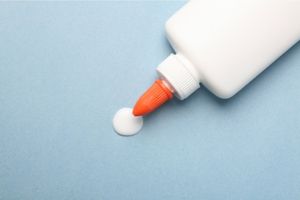Where would we be without glue? With so many different types available for all kinds of DIY and household projects, it helps to have a supply around when we might need it. But, what about the fire risks of keeping glue in the house? Is glue flammable? Does this apply to all types of glue and what else should we be aware of?

Generally glue is not flammable, however, depending on the type of glue and the form it is provided, glue may be flammable. First, glue comes in a wide range of forms, and some are going to contain more flammable components than others. Second, the flammability of glue can change depending on its form. For example, a cured form of glue may be perfectly safe while the liquid form isn’t.
With all this in mind, we need to consider the question of is glue flammable from different directions. I want to start by looking at the composition and risks of a few different household types of glue, before looking more closely at superglue.
Table of Contents
Is Glue Flammable When Wet?
Wet glue can be a fire risk because of the active ingredients within the liquid. But, it all depends on the composition of the glue.
For example, some contain high levels of strong chemicals and solvents. This can prove to be a big problem in contact with flames, so a tube of these industrial glues could combust in a fire.
However, there are also lots of glues that are water-based. Water-based products are not as flammable and some glues may have such a high water content that they won’t burn at all.
Then there are the plastic-based glues that are more likely to melt than to catch alight.
Is Glue Flammable When Dry?
Once the glue has dried and created a bond between two materials, the chemical composition is a lot different.
Typically, this means that glues that were flammable due to their solvent content are no longer such a risk because this is no longer active.
However, some glues may still burn or melt depending on their form. It really does depend on what you are working with.
Are Craft Glues Flammable?
On one side of the spectrum with glue products, we have craft glues and adhesives used for art projects and general use. These are designed to be as safe as possible so that children can play around with them with no risk of burns or toxicity.
Some of the most popular of these are water-based products like Elmer’s Glue. This is similar to PVA and glue sticks as something safe and effective for use in schools.
The liquid glue is not a fire risk because of the water content. But, the dried glue can still burn.
Hot glue sticks are another popular choice for schools, although for a much older age group. Glue guns are great for more substantial builds where designers melt the glue stick in the heated gun and use that to bond materials together.
There is little to no fire risk from the dry glue sticks or from the molten glue. The biggest risks here are the potential burns from mishandling the molten glue or malfunctions with the glue guns.
As long as the gun is well maintained and not used in an overloaded socket, there shouldn’t be an issue.
Are Household Glues Flammable?
Then there is the factor of other household glues we might use for DIY projects. These come with a greater safety warning because of the stronger chemical adhesives involved.
It is always a good idea to work with these in ventilated areas and keep them away from the skin. The flammability of these glues will depend on the product and type.
Is Gorilla Glue Flammable?
Gorilla Glue is one of the most popular products around because of its strength, easy application, and accessibility. It is a go-to choice for a lot of homeowners and DIY applications.
The good news is that while wet Gorilla Glue could be a fire risk if it ends up in a blaze, there are hardly any concerns about the dried glue.
That is because the flammable components have evaporated by this point. It is also designed to hold its form in temperatures up to 220 degrees Fahrenheit, so it would take a lot of heat to melt the bond once dry.
Is Super Glue Flammable?
When it comes to super glue, I want to talk about its risk factors in a little more detail. That is because not only is superglue one of the most common forms of glue found in our homes, but it is also one of the most dangerous.
There are a few different reasons for this.
The first reason is that superglue is another glue that is flammable in its liquid state, the chemical adhesives can ignite in contact with a flame.
So, you want to make sure you store any tubes of superglue away from sources of open flames.
Is Super Glue Flammable When Dry?
Superglue isn’t such a risk when it is dry, and it will dry out very quickly. A positive side to superglue’s flammability rating is that it melts at 368 degrees Fahrenheit, which is much hotter than Gorilla Glue.
Is It True That Super Glue Can Combust On Cotton?
This may sound like a strange question unless you are already aware of these tales online. You may have even seen videos proving that it is indeed true.

There is a higher fire risk when superglue comes into contact with cotton or other highly flammable materials.
This all comes does to a chemical within superglue called cyanoacrylate. This can cause an exothermic reaction when in contact with flammable materials, and cotton is a great example because of its plant-based structure and low ignition point.
What this means is that you need to be very careful when using superglue on materials like cotton. You also want to refrain from using cotton rags to wipe up any spills.
Is Loctite Explosive?
There are also stories where people say that a tube of superglue exploded in their hands. There are sure to be other factors involved here as the tube would not have just exploded without some other chemical reaction or high heat.
What actually happened likely was that the liquid burst through a pin prick hole in the seal and the term explosion was hyperbolic.
While this can sound like an amusing accident, there is the bigger risk here of the glue drying onto the skin and possibly bonding fingers together.
You will see people saying that emergency medical attention is needed here.
But, it is possible to break the bonds and clean off the glue with acetone or rubbing alcohol. Nail polish remover is a good source of acetone.
Is Super Glue Toxic?
Yes. There is a toxicity warning when dealing with superglue and many other strong-smelling glue products.
If you have ever heard of addicts sniffing glue to get high, it is because of the high level of solvents. This can be highly dangerous and is why it is best to work with these glues in a ventilated area.
Liquid superglue that burns in a fire can also emit toxic fumes. Once the glue is dry and the chemicals have evaporated, there is no longer the same risk.
Always Stay Safe When Using Glue.
It doesn’t matter what glue you use, you must always keep yourself and others as safe as possible. This means adequate ventilation, no smoking around the liquid, and being careful not to breathe it in.
It is also crucial not to ingest it, or get any on clothes and fingers if it has intense polymers and toxins.
How To Tell If Glue Is Flammable Or Not.
The best piece of advice that I can give about glue and flammability warnings is to read the labels carefully. Each form of glue should have some indication on the packaging about whether it is flammable in any way, as well as its toxicity.
If you can’t find the information on the product itself, perhaps because it is such a small tube, you can always check the company’s website or contact them directly for more information.
If you are still unsure, the best thing to do is to always make sure that the glue is kept away from high heat and open flames and to use it in a well-ventilated area.
Naturally, the risks are much lower for a craft glue than a stronger adhesive but better to be safe than sorry.
In summary, I have to reiterate my original point that you can’t make one blanket statement about all glues.
The water-based children’s glue products used in schools are nowhere near the same thing as the intense adhesives and superglue products we use at home.
Because of this, there are far greater flammability, toxicity, and general safety risks when dealing with superglue compared to craft glue or other household options.
Whatever glue you use, make sure to follow all guidelines for safe practice.